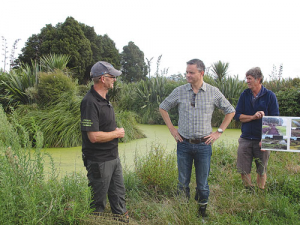DairyNZ Tests Heat Stress Solutions for Dairy Herds
New DairyNZ research will help farmers mitigate the impacts of heat stress on herds in high-risk regions of the country.
 Climate Change Minister James Shaw (centre) with farmer Aiden Bichan (left) at Kaiwaiwai Farm Wetlands, Featherston.
Climate Change Minister James Shaw (centre) with farmer Aiden Bichan (left) at Kaiwaiwai Farm Wetlands, Featherston.
Reducing onfarm emissions is a challenge facing all farmers, not just dairy. In fact, it is one of the biggest challenges facing the food producing sector worldwide.
New Zealand is more reliant on agriculture than many of its peers, and this year is a big one for farmers.
The Government is on track to introduce a zero carbon bill this year which will set an ambitious net zero emissions goal, and it plans to form an independent climate commission that will decide whether agricultural emissions will face a price in the ETS.
I recently joined Climate Change Minister James Shaw on a visit to Wairarapa to meet with dairy, sheep and beef, and arable farmers. The minister wanted to discuss the effects of climate change in the regions, and the mitigations by which farmers are reducing their carbon footprint.
What the minister made clear was the need for farmers to get a head start on regulations by looking at what mitigations they can adopt right now.
One person’s ‘impossible’ is another’s ‘possible’. While there is a perception that dairy farmers have their heads in the sand, in fact most want to do something about it.
It was a reflection on how engaged the agricultural sector is in addressing our emissions that representatives from so many farming sectors attended the Wairarapa meetings. They understand that an integrated approach to addressing water quality, biodiversity and onfarm emissions is needed if the sector is to meet the challenges of climate change.
Some farmers are ahead of the curve, planting extensively on their properties, adopting more efficient effluent management systems, and changing feed type, all while remaining profitable.
Kaiwaiwai dairy farm, one of the farms I visited with Minister Shaw, has even managed to halve the amount of water used on the farm and built a wetland to process nitrate runoff and reduce nitrous oxide emissions.
This year is the crunch point for all farmers. Through the Dairy Action for Climate Change, which is a DairyNZ and Fonterra initiative, we are working to educate farmers so they understand the issue and the mitigations now available, and the policy and science behind onfarm emissions.
The next step will be to work with the Government and the climate change commission to develop an emission reduction plan for the sector; that way we will know what to expect and can plan ahead.
This is our chance to take a leadership position on climate change. Getting ahead of the regulations is a great opportunity for the agricultural sector to show the public we are taking climate change seriously and that we are doing something about it.
• Kara Lok is a senior climate change advisor to DairyNZ.
The South Island Dairy Event has announced Jessica Findlay as the recipient of the BrightSIDE Scholarship Programme, recognising her commitment to furthering her education and future career in the New Zealand dairy industry.
New Zealand and Chile have signed a new arrangement designed to boost agricultural cooperation and drive sector success.
New DairyNZ research will help farmers mitigate the impacts of heat stress on herds in high-risk regions of the country.
Budou are being picked now in Bridge Pā, the most intense and exciting time of the year for the Greencollar team – and the harvest of the finest eating grapes is weeks earlier than expected.
The Real Estate Institute of New Zealand (REINZ) has released its latest rural property report, providing a detailed view of New Zealand’s rural real estate market for the 12 months ending December 2025.
Rural retailer Farmlands has released it's latest round of half-year results, labeling it as evidence that its five-year strategy is delivering on financial performance and better value for members.
OPINION: Expect the Indian free trade deal to feature strongly in the election campaign.
OPINION: One of the world's largest ice cream makers, Nestlé, is going cold on the viability of making the dessert.